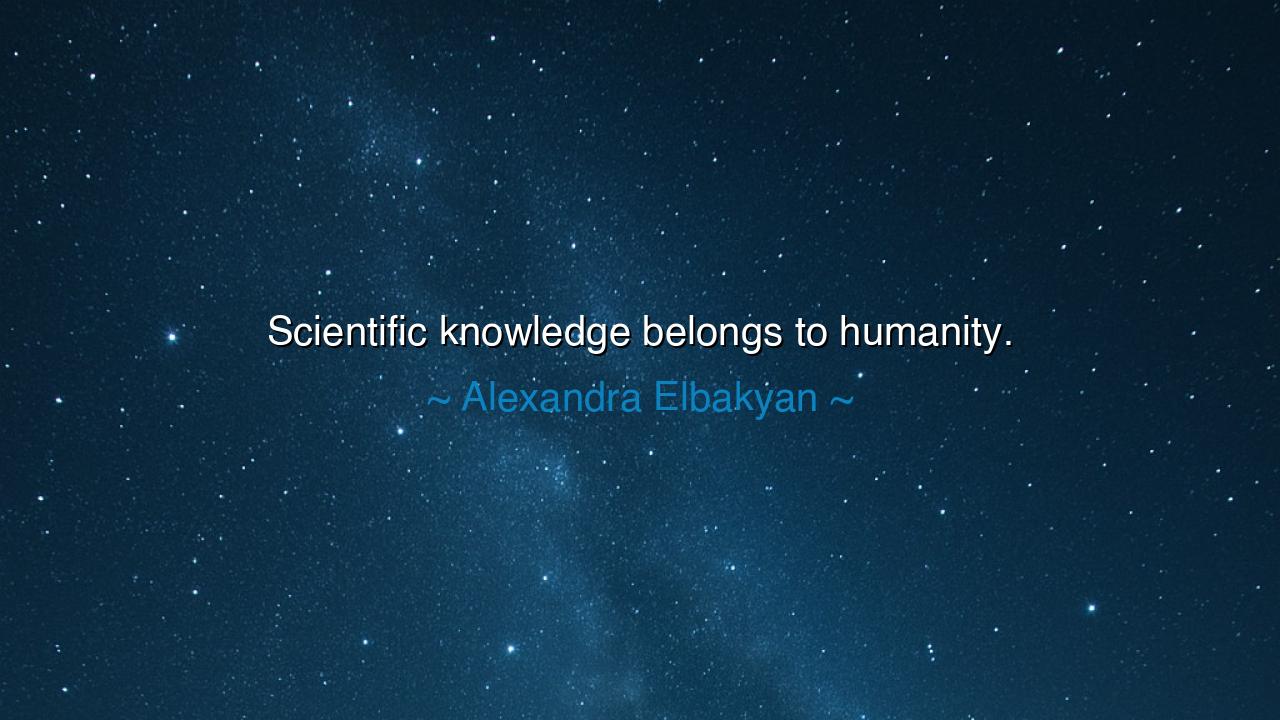
Scientific knowledge belongs to humanity.






Hear the bold words of Alexandra Elbakyan, who stood defiant before the gates of guarded knowledge and declared: “Scientific knowledge belongs to humanity.” In this short phrase lies a truth as vast as the heavens—that wisdom, born of inquiry and discovery, is not the property of the few but the inheritance of all. For science is not a jewel to be locked away, nor a treasure for the wealthy alone; it is the flame of understanding meant to illuminate the whole earth.
From the earliest days, humanity has shared its discoveries. The first who tamed fire did not keep it hidden but gave it to the tribe, so that all might be warmed, fed, and defended. The one who first drew constellations upon the night sky did not hide them in secret, but taught them to sailors, guiding ships across seas. The builders of wheels, the keepers of seeds, the healers with herbs—each act of knowledge was not hoarded, but shared, for it was understood that survival and flourishing depended on the many, not the few. Elbakyan’s cry returns us to this ancient law: that science is strongest when it is common wealth.
History offers us shining examples. Consider Jonas Salk, who discovered the polio vaccine. When asked who owned the patent, he replied: “There is no patent. Could you patent the sun?” By refusing profit, he ensured that millions could be protected from disease, restoring life and hope to nations. Here is the living proof of Elbakyan’s words: scientific knowledge belongs to humanity, and when treated as such, it becomes not wealth for one man but salvation for millions.
But there are darker lessons as well. When knowledge is locked away, suffering multiplies. In the Middle Ages, much wisdom of the ancients lay hidden in cloisters and guarded libraries, accessible only to a chosen few. Generations stumbled in ignorance until that knowledge was rediscovered and spread, igniting the Renaissance. And even now, in our own age, research and discoveries are often walled behind costly barriers, so that the poor, the students of struggling nations, and the seekers outside privilege cannot reach them. Elbakyan’s voice rises against this injustice, proclaiming that the fruits of science are not for the market alone, but for the world.
Her words are also a call to courage. To say that knowledge belongs to humanity is to challenge powers that profit from its restriction. It is to risk, to stand against the merchants of wisdom who turn truth into commodity. Yet history has always honored those who defended the open sharing of learning. Socrates gave his teachings freely in the marketplace. Galileo risked the wrath of the Church to speak what he had seen in the stars. Elbakyan, in her own way, joins this long line of rebels who believed that the light of truth must not be hidden under a bushel, but set upon a hill.
The lesson for us, O seeker, is clear: cherish knowledge not as possession, but as gift. Whatever you learn, whatever you discover, share it. Teach the child, help the student, aid the stranger. Support movements, schools, and libraries that make learning free for all. Resist the temptation to hoard wisdom for profit or pride, for wisdom hoarded dies, but wisdom shared multiplies.
Thus let Alexandra Elbakyan’s words endure as both command and promise: scientific knowledge belongs to humanity. It belongs to the farmer who tills the soil, the doctor who heals, the student who dreams, the builder who constructs, the poet who reflects. It belongs to all, for it was born from all—the countless hands and minds who, through ages of trial and error, have contributed to the great library of human understanding. Guard this truth, live it, and pass it on, that future generations may walk not in darkness, but in the light of shared knowledge.






AAdministratorAdministrator
Welcome, honored guests. Please leave a comment, we will respond soon